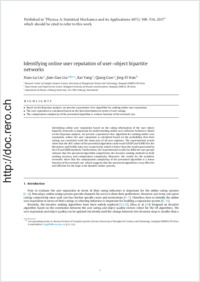Identifying online user reputation of user–object bipartite networks
- Liu, Xiao-Lu Research Center of Complex Systems Science, University of Shanghai for Science and Technology, China
- Liu, Jian-Guo Research Center of Complex Systems Science, University of Shanghai for Science and Technology, China - Data Science and Cloud Service Centre, Shanghai University of Finance and Economics, China - Department of Physics, University of Fribourg, Switzerland
- Yang, Kai Research Center of Complex Systems Science, University of Shanghai for Science and Technology, China
- Guo, Qiang Research Center of Complex Systems Science, University of Shanghai for Science and Technology, China
- Han, Jing-Ti Data Science and Cloud Service Centre, Shanghai University of Finance and Economics, China
-
01.02.2017
Published in:
- Physica A: Statistical Mechanics and its Applications. - 2017, vol. 467, p. 508–516
English
Identifying online user reputation based on the rating information of the user–object bipartite networks is important for understanding online user collective behaviors. Based on the Bayesian analysis, we present a parameter-free algorithm for ranking online user reputation, where the user reputation is calculated based on the probability that their ratings are consistent with the main part of all user opinions. The experimental results show that the AUC values of the presented algorithm could reach 0.8929 and 0.8483 for the MovieLens and Netflix data sets, respectively, which is better than the results generated by the CR and IARR methods. Furthermore, the experimental results for different user groups indicate that the presented algorithm outperforms the iterative ranking methods in both ranking accuracy and computation complexity. Moreover, the results for the synthetic networks show that the computation complexity of the presented algorithm is a linear function of the network size, which suggests that the presented algorithm is very effective and efficient for the large scale dynamic online systems.
- Faculty
- Faculté des sciences et de médecine
- Department
- Département de Physique
- Language
-
- English
- Classification
- Physics
- License
-
License undefined
- Identifiers
-
- RERO DOC 287945
- DOI 10.1016/j.physa.2016.10.031
- Persistent URL
- https://folia.unifr.ch/unifr/documents/305437
Statistics
Document views: 132
File downloads:
- pdf: 234
